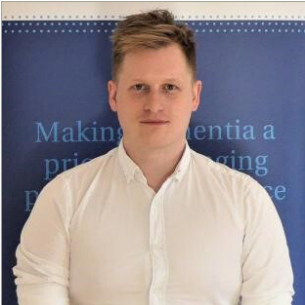Current estimates suggest that some 9 million people are living with dementia in Europe (EU28) (Alzheimer Europe [AE], 2017, unpublished document). Many of these individuals live at home in the community. However, due to different circumstances, and at different stages of the condition, some people will need or will choose to move to a residential care facility. Also, some people may develop dementia after moving to residential care.
It is still a challenge to estimate what proportion of people living in residential care facilities have dementia. Whilst this may vary greatly from country to country,1 research has indicated that many people living in care and nursing homes have dementia. In Ireland, a small-scale study showed that around one third of residents in the surveyed nursing homes had a clinical diagnosis of dementia, and a very large number of residents had a cognitive impairment which, in around a half of the cases, was severe.2 Likewise, other countries, such as the United Kingdom (UK) and Switzerland, have reported that a large proportion of residents have dementia or a significant cognitive impairment suggestive of dementia.3,4 People with dementia living in residential care settings often have more complex needs, may experience challenges in communicating these needs and may be less able than others to cope with inadequate care.
In 2017, AE looked at existing standards and regulatory requirements that residential care facilities, including both care and nursing homes, must meet when providing care, with a particular focus on the standards developed for people with dementia. This was part of AE’s Work Plan, which received funding from the European Union in the framework of the Health Programme. The information was provided by AE members (i.e., national Alzheimer associations) and other national experts that AE identified and invited to participate (Austria, Belgium, Bulgaria, Cyprus, Latvia, Lithuania and Sweden). The report ‘2017 Dementia in Europe Yearbook’4 provides a comparative overview of the existing standards and provisions on the following areas:
- physical environment;
- workforce;
- provision of care;
- palliative care; and
- abuse and restraint.
Key findings in the 2017 Yearbook
Even though many of the existing standards and requirements for older people in residential care are relevant to people with dementia, few address the specific needs of people with dementia. Many countries have developed (not binding) guidelines or standards for the care of people with dementia (not specific for residential care). This oversight is important, as people with dementia have different and often more complex needs and therefore require a different approach or provisions. People in more advanced stages of dementia are often less able to defend their interests and rights and to communicate their preferences.
The physical environment is essential for the wellbeing of residents. The report identifies standards, addressing various aspects of the physical environment in the vast majority of countries. However, the report also highlights important differences across Europe (e.g., related to the size of private and common spaces, access to outdoor spaces, privacy and the right to choose, for example, whether or not to share a room or what or where a person wants to eat). As an example, in terms of occupancy of private rooms, in around a quarter of the countries, up to four residents can be accommodated in the same room. On the other hand, in Belgium-Flanders, Finland, Ireland, Norway and the UK all, or a very high proportion of rooms should be single. Standards regarding outdoor spaces were found in fewer than half of the countries involved in the report.
Standards related to one or more aspects of the workforce are present in almost all countries (e.g., the amount of personnel, skills, qualifications, composition of the team). The quality of the care provided is not dependent solely on the number of staff, but also on the right skill mix, qualifications, training and experience of the staff. Several countries have strict ratios for personnel or qualifications, whereas others allow for more flexibility. Whilst in the majority of cases standards require that the staff receive training, only a handful of countries reported specific requirements related to dementia training on the issues addressed in this report. Dementia training on challenging behaviours, supported decision making and participation and abuse, would be particularly relevant for the staff providing care and could also have a great impact on the lives of residents.
Admission into a residential care facility can be a stressful time for many people with dementia and their carers. Around a third of the countries reported specific requirements allowing the person to visit the facility and spend some time there before making the decision to move in. Many countries reported this was a common practice but it was not specified in the standards. We found requirements in all countries in relation to the need to document some personal, health and social information for each resident and, in some cases, specifically to draw up a care plan. In some countries, this focuses mainly on medical and nursing issues, whereas in others this seems to take a more holistic approach. Important differences also relate to the expected involvement of the resident and his/her family in drawing up and reviewing the care plan.
The lack of specific standards regarding the use of restraint and the provision of end-of-life care are some of the most concerning gaps identified in the report, especially as a lot of people with dementia spend their last days of life and die in these settings. The use of restraint also represents significant ethical and legal challenges and is a topic of particular relevance to people with dementia who may be vulnerable and unable to understand and express their wishes.
In conclusion, the quality of care provided in residential care facilities in Europe is a complex and challenging topic. There are important differences in the way long-term care is organised and provided across Europe. People with dementia living in these care settings should have the same rights and opportunities as other residents to have a good quality of life. Staff, residents and family members should be aware and well informed about their rights and what they should be able to expect from care. Clear, accessible, dementia-specific standards and appropriate training for staff to address this issue are not yet widespread in Europe.














